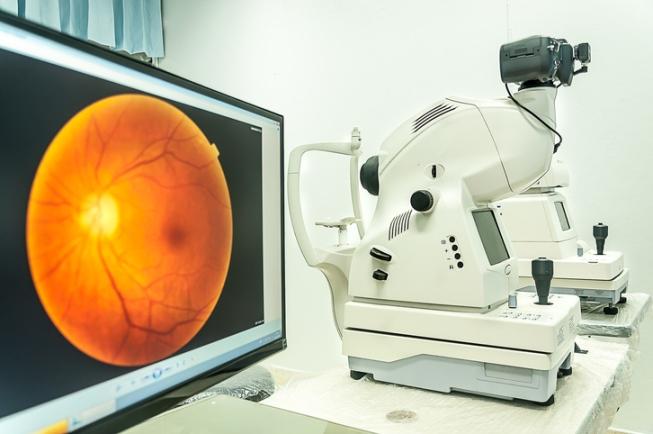Adding another serious condition to the list of Zika complications, a team from Brazil and the United States published the first report of glaucoma in a baby born with severe virus-related birth defects.
Clinicians have already documented eye problems in the posterior part of the eye in babies born with Zika virus, but the new report, published in the journal Ophthalmology, is the first to describe a problem involving the anterior chamber. Glaucoma can permanently damage the optic nerve, leading to blindness.
In other developments, researchers reported new findings on the vulnerability of developing fetal brain cells to Zika virus, while health officials released new case updates, including England's first sexually transmitted infection, more local cases in Florida, and Bolivia's first Zika-related Guillain-Barre syndrome (GBS) case.
Glaucoma developed after birth
The baby who had glaucoma is a 3-month-old boy born with microcephaly in northeastern Brazil, an area hit hard by Zika virus. He developed an enlarged right eye, along with photophobia and persistent tearing. His mother had experienced a rashlike illness during the fourth week of pregnancy, and the baby tested positive for Zika antibodies.
An eye exam done 3 days after birth revealed some right eye abnormalities, but not glaucoma.
Doctors examined the baby for the eye enlargement 95 days after birth. At day 114, the child underwent trabeculectomy to relieve pressure in the right eye, and samples of aqueous humor and vitreous were negative for Zika RNA.
The researchers said physicians should be aware of the possibility of glaucoma in Zika-affected babies, adding that more research is needed to determine if glaucoma and anterior-segment lesions are related to the direct or indirect damage from the virus during pregnancy or after birth.
'Minibrain' findings and how Zika infects
In lab research developments, a study today involving cell-culture "minibrains" to explore how Zika damages fetal brains found that the virus can infect neural progenitor cells (NPCs), even when the cell surface lacks AXL proteins, which Zika is thought to latch onto for cell entry. Researchers from Harvard University and Novartis published their findings in Cell Stem Cell.
Earlier studies have suggested that blocking AXL protein expression defends several human cell types against Zika virus, and labs have been working on the hypothesis that AXL is Zika's entry point into the developing brain.
In the latest study, however, researchers working with two-dimensional cell culture and three-dimensional organoids (minibrains) of NPCs genetically engineered to knock out the AXL protein found that Zika infected the cells, just as with normal ones that contain AXL.
Kevin Eggan, PhD, study coauthor who is with Harvard Stem Cell Institute, said in a Harvard press release, "Our finding really recalibrates this field of research, because it tells us we still have to go and find out how Zika is getting into these cells."
His coinvestigator from Novartis, Ajamete Kaykas, PhD, said, "It's very important for the research community to learn that targeting the AXL protein alone will not defend against Zika."
New cases, GBS, mosquito study
- Public Health England (PHE) yesterday announced the country's first sexually transmitted Zika case, involving a woman whose partner had recently visited an area where Zika is circulating locally. It said the woman has fully recovered and that although sexual transmission cases are rare, the main threat is to those traveling to areas considered at moderate to high risk. PHE repeated its advice that men traveling to Zika-affected destinations take sexual precautions for 6 months after returning home and that female travelers take steps to avoid pregnancy for 8 weeks after leaving Zika-hit areas. Thirteen countries have now reported sexual transmission of the virus.
- The Florida Department of Health (Florida Health) yesterday reported four more local Zika cases, lifting the state's total to 244. The new cases all involve Miami-Dade County residents, and investigators are still working to determine where each of them was exposed to the virus.
- The World Health Organization (WHO) said today in its weekly Zika update that Bolivia has reported its first GBS case linked to the virus. Bolivia's case lifts the number of countries or territories reporting Zika-linked GBS to 20.
- A new study published today describes a blood test that can assess exposure to Aedes mosquitoes, which may be a useful tool for gauging the impact of vector control programs. Researchers from France and the Indian Ocean island La Reunion described their findings today in PLoS Neglected Tropical Diseases. The test is based on a peptide from Aedes aegypti saliva. Their research on Le Reunion found that 88% of people had an antibody reaction to the Ae aegypti peptide, even though they had been exposed to only Ae albopictus mosquitoes.
See also:
Nov 30 Ophthalmol abstract
Nov 30 Yale University press release
Dec 1 Cell Stem Cell abstract
Dec 1 Harvard University press release






















